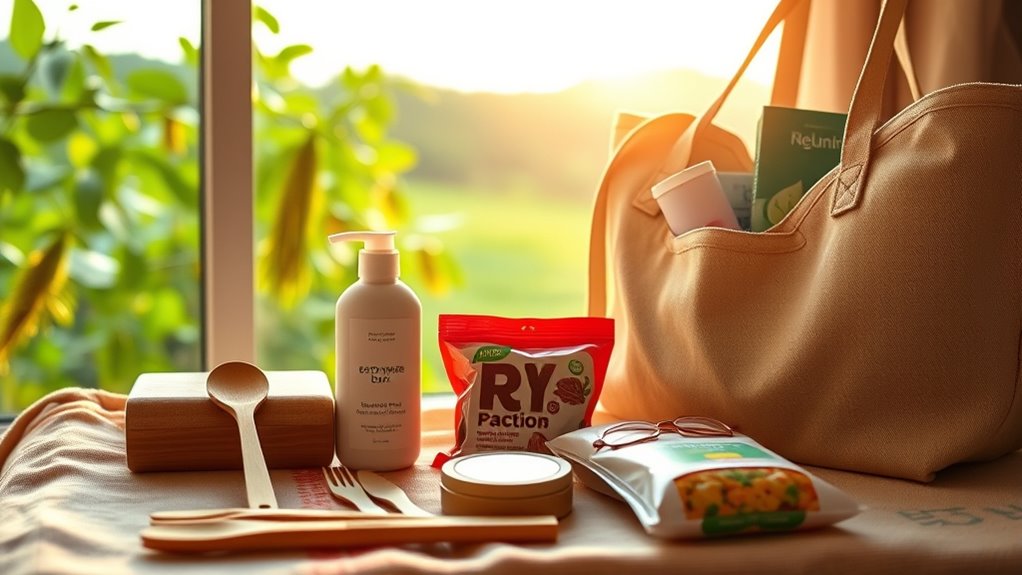To lower your footprint before an emergency, choose reusable, eco-friendly supplies like bulk foods in reusable containers, solar-powered gadgets, and natural fibers for clothing. Reduce energy consumption by installing solar chargers and insulating your home. Cut waste with composting, repairing items, and avoiding single-use plastics. Making mindful choices now helps you prepare responsibly while protecting the environment. Exploring sustainable strategies further can empower you to create a more resilient, eco-conscious plan for any crisis.
Key Takeaways
- Opt for reusable, eco-friendly supplies like refillable bottles and biodegradable gear to minimize waste.
- Choose organic, locally sourced foods to reduce energy use from transportation and production.
- Install solar panels or portable solar chargers to harness renewable energy and cut reliance on grid power.
- Practice waste reduction by repairing, reusing, and composting to lower landfill impact.
- Insulate your home and use energy-efficient appliances to decrease overall energy consumption before emergencies occur.

Have you ever wondered how to prepare for emergencies without harming the environment? It’s a smart question, especially as we become more aware of how our actions impact the planet. Preparing sustainably means making choices that reduce your carbon footprint, minimize waste, and support eco-friendly practices. You don’t need to overhaul your entire lifestyle overnight, but small, deliberate steps can make a big difference in both your readiness and the health of the planet.
Start by choosing eco-conscious supplies whenever possible. When stocking up on food, opt for bulk items stored in reusable containers instead of single-use packaging. Think about organic, locally sourced foods that require less energy to produce and transport. This not only cuts down on packaging waste but also supports sustainable farming practices. For water, select refillable bottles rather than disposable plastic ones, and consider installing a water filter to reduce plastic waste and ensure clean drinking water. These choices help you stay prepared while avoiding unnecessary landfill contributions.
Choose reusable containers, support local organic foods, and use refillable bottles to prepare sustainably.
When assembling your emergency kit, focus on sustainable and durable items. Use reusable batteries or energy-efficient flashlights instead of disposable ones. Solar-powered gadgets are excellent because they harness renewable energy, reducing reliance on batteries that eventually end up in landfills. Choose natural fiber clothing and blankets made from organic cotton or wool, which are biodegradable and less toxic compared to synthetic materials. By investing in quality, long-lasting gear, you cut down on waste and ensure your supplies can withstand repeated use.
Another essential aspect of sustainable prepping involves energy management. Consider installing solar panels or using portable solar chargers to power your devices. Not only does this reduce your reliance on grid electricity, which often relies on fossil fuels, but it also ensures you have a renewable energy source during power outages. Additionally, practice energy conservation in your daily routine—turn off unused electronics, switch to energy-efficient appliances, and insulate your home to lower heating and cooling needs. These habits help decrease your overall carbon footprint and prepare your home to be more resilient during emergencies.
Finally, adopt a mindset of minimalism and reuse. Repair, repurpose, and donate items instead of discarding them. Compost organic waste to prevent it from ending up in landfills and produce natural fertilizer for your garden. Incorporate whole-house water filtration systems to ensure clean water for your household, reducing reliance on bottled water and minimizing plastic waste. By reducing waste and emphasizing reuse, you create a more sustainable approach to preparedness that benefits both you and the environment. Preparing sustainably isn’t just about being eco-friendly; it’s about creating a resilient, responsible way to face emergencies while leaving a lighter footprint on the planet.
Frequently Asked Questions
How Can I Reduce Plastic Waste During Travel?
You can reduce plastic waste during travel by bringing reusable items like bottles, bags, and containers. Avoid single-use plastics such as straws, cutlery, and bottles. Opt for eco-friendly products and refillable options whenever possible. Support local businesses that use minimal packaging and refuse plastic-wrapped goods. By planning ahead and making mindful choices, you minimize your plastic footprint and contribute to a cleaner, healthier environment during your trip.
What Eco-Friendly Travel Gear Is Most Effective?
You should choose reusable items like stainless steel water bottles, bamboo utensils, and cloth shopping bags. Opt for eco-friendly travel gear made from sustainable materials, such as biodegradable toiletries and organic cotton clothing. Lightweight, durable gear reduces waste and minimizes your environmental impact. Look for products with eco-certifications to verify they’re genuinely sustainable. By selecting these eco-friendly options, you make a meaningful difference while enjoying your trip comfortably and responsibly.
How Do I Find Sustainable Accommodations?
Imagine you’re a modern-day explorer seeking eco-friendly stays. To find sustainable accommodations, you can use platforms like EcoBnB or Green Key, which vet properties for eco-credentials. Check reviews for eco-conscious practices like energy efficiency, recycling, and local sourcing. Contact hotels directly to ask about their sustainability efforts. Remember, a quick online search can reveal green lodges or eco-resorts that align with your values, making your trip both memorable and mindful.
Are There Eco-Friendly Transportation Options Available?
Yes, there are eco-friendly transportation options available. You can choose electric or hybrid rental cars, which produce fewer emissions. Opt for public transit, bikes, or walking whenever possible—these methods considerably reduce your carbon footprint. Many cities also offer shared mobility services like e-scooters and car-sharing programs. By planning ahead and selecting these sustainable options, you help lower your environmental impact while exploring new places.
How Can I Minimize Energy Use While Traveling?
You can minimize energy use while traveling by choosing energy-efficient transportation options like trains or buses instead of cars or flights. Pack light to reduce weight and energy consumption. Turn off electronics when not in use, and avoid long showers or unnecessary heating. Opt for walking or biking whenever possible, and plan routes wisely to cut down on travel time. Small changes like these make a big difference in conserving energy.
Conclusion
By preparing sustainably, you can considerably reduce your travel footprint. Did you know that a single long-haul flight can emit over a ton of CO₂? Choosing eco-friendly options like packing smart and minimizing waste makes a real difference. Before you go, remember that small changes add up—your efforts can inspire others and help protect the planet. So, make conscious choices now and travel lighter, leaving a positive impact wherever you land.










